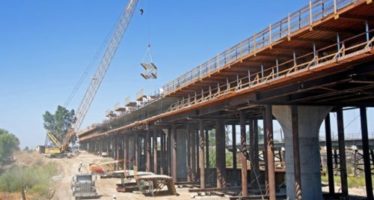IJ Calls For GOP To End RDAs
Steven Greenhut: Here is a press release from the Institute for Justice regarding Assembly Republicans’ decision to save redevelopment agencies.
Institute for Justice Calls on California Republicans To Eliminate
Costly and Abusive Redevelopment Agencies
Arlington, Va.—The Institute for Justice—the nation’s leading legal advocate against eminent domain abuse—is calling on Republicans in the California Legislature to approve a proposal currently before them that would eliminate more than 400 redevelopment agencies across the state. The Institute sent a letter to Republicans today urging them to set aside partisan politics and focus on protecting the private property rights of California’s hard-working home, small business and farm owners. The Institute for Justice litigated the infamous Kelo eminent domain case before the U.S. Supreme Court.
“The Institute for Justice has catalogued hundreds of abuses by California redevelopment agencies,” said Institute for Justice Senior Attorney Dana Berliner. “Eminent domain is used over and over to take property from one private party in order to give it to a more favored private developer. And California redevelopment bureaucrats continually violate the California laws and the Constitution, ignoring every effort by the Legislature to rein them in—most recently in 2007. The past decades have shown that these agencies refuse to be reformed, and it is time now for the Legislature to abolish them.”
California is one of the worst abusers of eminent domain in the nation. IJ has documented nearly 200 projects across the state that have threatened or used eminent domain for private gain; within each of those projects, dozens, hundreds, if not thousands of homes, businesses, churches and farms have been impacted. (That research can be downloaded at http://www.castlecoalition.org/3491.) ; California Scheming: What Every Californian Should Know About Eminent Domain Abuse explains how California’s reform efforts to date have not addressed the core problem of the state’s law, which provides incentives to perpetuate the designation of vast areas of the state as “blighted” and to continually increase redevelopment debt.
“Redevelopment in California is a billion-dollar, state-subsidized boondoggle responsible for out-of-control debt, higher taxes, and the erosion of private property rights through the habitual abuse of eminent domain,” said Christina Walsh, the Institute’s director of activism and coalitions. “This is a historic opportunity to finally end eminent domain abuse in California, which has been fraught with abuse, fraud and waste. Partisan politics shouldn’t stand in the way of protecting private property rights.” So far, only one Republican has voted to eliminate redevelopment: Chris Norby. Norby is a long-time defender of property rights and fiscally responsible government.
The purpose of California’s Community Redevelopment Law (CRL) was to remedy unsanitary urban slums that posed a genuine threat to the health and safety of the public. Like blight laws all over the nation, the CRL grants local governments the authority to use eminent domain to seize private property and transfer it to another private owner in the hope that the latter will cure the purported blight. But California redevelopment agencies stretch the law to declare nearly any area to be “blighted” and thus subject to eminent domain for private development.
Indeed, redevelopment in California often has little to do with true blight. Instead, redevelopment mutated into a multi-billion dollar profit machine in which hundreds of redevelopment agencies and thousands of private developers, lawyers, consultants and bankers continually strip valuable property from people of modest means and give it to big business.
The scope of the California redevelopment machine is enormous. There are over 400 active redevelopment agencies in California (about 80 percent of municipalities have one) overseeing around 750 blight zones. In fiscal year 2005-2006, these redevelopment agencies owned $12.9 billion worth of property (a $1.5 billion increase over the previous year) and had $8.7 billion in revenues. And according to a new report in the Orange County Register, “From January 1 through March 8, $689 million in bonds were issued in 45 separate measures by 30 local agencies, OC Watchdog reporter Teri Sforza found. The bonds must be repaid with property taxes that otherwise would pay for local government services such as police and schools. The new debt is on top of billions owed by redevelopment agencies for earlier bonded debts.”
The engine driving the redevelopment machine is debt and taxes. Under California law, once a local government declares an area “blighted,” its redevelopment agency gets a property tax windfall. In a scheme known as Tax Increment Financing, redevelopment agencies get 100 percent of the property tax revenue from a blight zone over and above the “baseline” amount of property taxes the area generated when it was first declared blighted.
California’s redevelopment agencies now siphon off most of the property taxes from the hundreds of blight zones across the state. In fiscal year 2005-2006, for example, the total assessed value of property in California’s blight zones was $537 billion. Because of Tax Increment Financing, however, redevelopment agencies received 100 percent of the property taxes on $381 billion of this total. Overall, redevelopment agencies capture about 10 percent of all property taxes collected in California.
A redevelopment agency, however, is entitled to its property tax windfall only if it goes into debt to implement the redevelopment plan. By 2004, redevelopment agencies in California had a total debt of $61 billion, and historical trends show that agency debts double about every 10 years. The addiction to debt and property taxes has caused outright financial insanity in some communities.
The perverse financial incentives of California’s redevelopment laws mean that redevelopment agencies: (1) want their blight zones to be as large as possible; (2) want their blight zones to last as long as possible; and (3) want to incur massive debt.
Cities, in this context, have perverse incentives of their own. They always want to replace low-tax land uses, such as single-family homes and small businesses, with tax-intensive uses, such as high-rise condominiums and big-box stores.
The absence of any concrete proof that redevelopment does any good makes California’s redevelopment machine one of the greatest scams of all time. Although redevelopment advocates like to point out shiny new big-box stores, there are a few things they do not like to talk about. First, studies repeatedly show that redevelopment projects are net economic losers once the true costs are tallied in terms of jobs and businesses destroyed, and tax breaks and other subsidies to big business. They also do not talk about how the preference for sales tax-generating retail mega-stores creates low-skill service jobs and destroys small businesses that frequently require skilled labor. Redevelopment agencies also do not talk about the personal implications of taking away someone’s cherished home or an entrepreneur’s small business. Finally, the last thing redevelopment apologists don’t want to discuss is the fact that redevelopment overwhelmingly targets the poor and minorities.
MARCH 31, 2011
Related Articles
CA IRS offices harassed conservative groups
May 15, 2013 By John Seiler California IRS offices harassed groups, reported the Daily Mail today. It was part of
Two new headaches for California high-speed rail project
The California High-Speed Rail Authority – the agency in charge of building the state’s bullet train system – has already
Lawmakers bow to pressure, abandon effort to fix property confiscation laws
Government agencies will continue to have the power to confiscate private property in California – without a criminal conviction –




